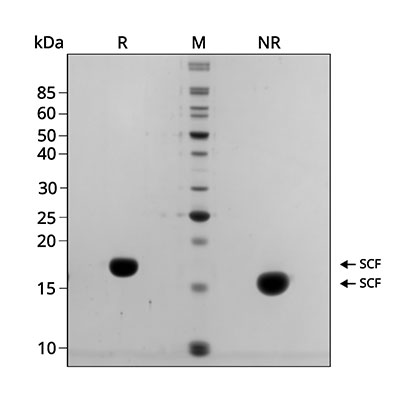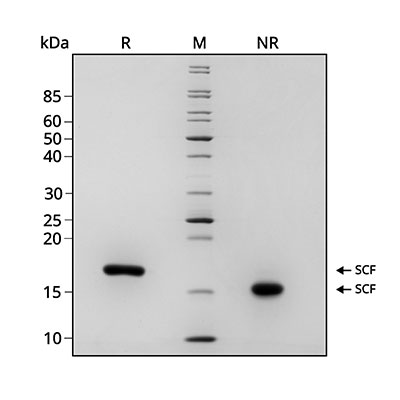 Recombinant human SCF protein (Qk078-CTG)
Recombinant human SCF protein (Qk078-CTG)Recombinant human SCF protein (Qk078-CTG)
Price range: £2,640.00 through £4,180.00
Stem Cell Factor (SCF) is a critical factor in the maintenance and expansion of hematopoietic stem cells (HSCs) in the bone marrow microenvironment. Key myeloid progenitor differentiation factor for a variety of myeloid cells such as megakaryocytes, basophils, neutrophils, and monocytes, Stem Cell Factor is also a primary growth and activation factor for mast cells and eosinophils.
Recombinant SCF is a highly pure 18.5 kDa monomer, animal origin-free (AOF) and carrier-protein-free (CF). Qkine has optimized the SCF manufacture process to produce a highly bioactive protein with excellent lot-to-lot consistency for enhanced reproducibility.
Qkine cell therapy grade high purity animal origin-free proteins are manufactured as GMP grade equivalents in an ISO 9001:2015-certified facility, under ISO 20399:2022 standards with GMP compliance, defined quality criteria and documentation.
This product is available to order now and will be in stock soon, please contact us for the estimated lead time customerservice@qkine.com
In stock
Orders are typically shipped same or next day (except Friday).
Easy world-wide ordering, direct or through our distributors.
Price range: £2,640.00 through £4,180.00
Buy online with secure credit card or purchase order. For any questions, please email orders@qkine.com
Summary:
- High purity human SCF protein (Uniprot number: P21583)
- 18.5 kDa (monomer)
Certified animal origin-free (AOF)
Cell and gene therapy grade
Manufactured in our ISO 9001:2015 facility in Cambridge, UK
Lot-to-lot consistency in bioactivity
Full traceability and documentation
Carrier protein-free, tag free
Expressed in E. coli
Lyophilized from acetonitrile, TFA
- Resuspend in sterile-filtered water at >50 µg/ml, add carrier protein if desired, prepare single use aliquots and store frozen at -20 °C (short-term) or -80 °C (long-term).
Featured applications:
Immune cell therapy expansion
Neural stem cell (NSC) therapy
Regenerative stem cell therapy

Recombinant SCF activity was determined using proliferation of TF-1 human myeloid leukemia cells. Cells were treated in triplicate with a serial dilution of SCF for 48 hours. Cell viability was measured using the CellTiter-Glo (Promega) luminescence assay. Data from Qk078 lot #204621. EC50 = 1.41 ng/ml (76 pM).
Recombinant SCF migrates at approximately 18 kDa (monomer) in reduced (R) and at approximately 15 kD in non-reduced (NR) conditions. No contaminating protein bands are present. The purified recombinant protein (3 µg) was resolved using 15% w/v SDS-PAGE in reduced (+β-mercaptoethanol, R) and non-reduced (NR) conditions and stained with Coomassie Brilliant Blue R250. Data from Qk078 lot #204621.

Further quality assays
Mass spectrometry: single species with expected mass
Purity >98%, by SDS-PAGE quantitative densitometry
Recovery from stock vial: >95%
Sterility tested and mycoplasma negative
Endotoxin: <0.005 EU/μg protein (below level of detection)
Residual host cell protein <10 ng/µg
Residual host cell DNA <10 ng/μg
N-terminal sequence analysis
We are a company founded and run by scientists to provide a service and support innovation in stem cell biology and regenerative medicine. All our products are exceptionally high purity, with complete characterisation and bioactivity analysis on every lot.
Protein background
Stem Cell Factor (SCF), also known as kit-ligand or mast cell growth factor, is a pivotal protein in stem cell function, from embryonic development to tissue regeneration and cancer biology [1]. SCF functions primarily through interaction with its receptor, c-kit, a transmembrane tyrosine kinase receptor expressed on the surface of various cell types, including hematopoietic stem cells, neural crest-derived cells, melanocytes, and germ cells. Upon binding to c-kit, it triggers a cascade of intracellular signaling pathways, such as the Ras/MAPK, PI3K/Akt, and JAK/STAT pathways, which regulate cell proliferation, survival, migration, and differentiation [2,3].
Stem Cell Factor serves as a crucial ligand for its receptor, c-Kit, initiating signaling cascades upon binding. SCF can also be processed into a soluble form through proteolytic cleavage near the cell membrane. This cleavage releases the extracellular domain of SCF into the extracellular space, generating soluble SCF. Despite this modification, soluble SCF retains its ability to bind to c-Kit and activate downstream signaling pathways. Soluble SCF may act as a paracrine or autocrine factor, exerting its effects on nearby cells or the same cell producing it [3,4].
One of the key roles of SCF is in hematopoiesis, where SCF acts as a critical factor in the maintenance and expansion of hematopoietic stem cells (HSCs) in the bone marrow microenvironment [5,6]. It not only promotes the self-renewal of HSCs but also facilitates their differentiation into various blood cell lineages, including red blood cells, mast cells, and platelets [4].
Stem Cell Factor plays a crucial role in embryonic development, where it contributes to the formation of various tissues and organs. During embryogenesis, SCF is implicated in the proliferation, migration, and survival of neural crest cells, which give rise to a diverse array of cell types, including neurons, glial cells, melanocytes, and smooth muscle cells [7].
Beyond its roles in normal physiology, dysregulation of SCF signaling is associated with various pathological conditions, including cancer [8]. Aberrant activation of the SCF/c-kit pathway is observed in certain types of cancer, such as gastrointestinal stromal tumors (GISTs), acute myeloid leukemia (AML), and melanoma. In these malignancies, mutations in c-kit or overexpression of SCF contribute to uncontrolled cell proliferation, survival, and metastasis, making the SCF/c-kit axis an attractive target for cancer therapy [9].
Additional resources
FAQ
SCF is added to cell culture media as a supplement to provide essential signals for stem cell survival, proliferation, and differentiation. It acts as a growth factor, stimulating the activation of signaling pathways that regulate cellular processes crucial for stem cell function.
Yes, SCF is classified as a cytokine as it can be defined as a small protein that plays a crucial role in cell signalling and immune responses.
SCF binds to c-kit, which is also called the tyrosine-protein kinase kit or CD117. C-kit is a receptor tyrosine kinase that is expressed on the surface of hematopoietic stem cells, mast cells, melanocytes, germ cells, and interstitial cells.
SCF is a protein growth factor crucial for stem cell maintenance and differentiation, including hematopoietic stem cells in the bone marrow microenvironment.
Upon binding of SCF to c-kit, it triggers intracellular signaling cascades that regulate cell survival, proliferation, and differentiation.
The SCF/c-kit signaling pathway
SCF is found in the bone marrow, skin, gastrointestinal tract, reproductive organs, and nervous system. It is produced by fibroblasts, endothelial cells, stromal cells, and epithelial cells to support tissue homeostasis and regulate cellular processes such as hematopoiesis, melanogenesis, and immune responses.
Our products are for research use only and not for diagnostic or therapeutic use. Products are not for resale.
For use in manufacturing of cellular or gene therapy products. Not intended for in vivo applications.

Receive an Amazon gift voucher when you leave us a review.
£25, $30 or €30 for reviews with an image and £10, $15 or €15 for reviews without an image

